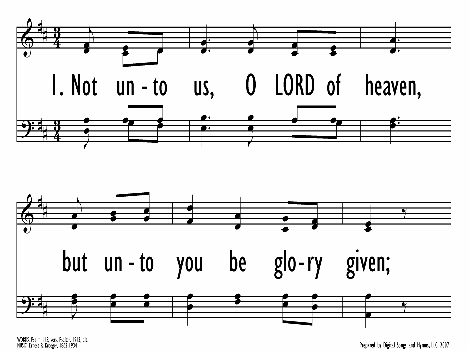- |
User Links
Not unto Us, O Lord of Heaven
Hymn Information
- First Line
- Not unto us, O Lord of heaven
- Text Source
- <cite>Psalter</cite>, 1912, alt.
- Tune Name
- VATER UNSER
- Arranger
- Alfred V. Fedak (1953)
- Tune Source
- V. Schumann's <cite>Geistliche Lieder</cite>, 1539
- Topic
- Idols/Idolatry · Elements of Worship: Praise and Adoration
Copyright Information
- Text Copyright
- Public Domain
- Tune Copyright
- arr. © 2011 Alfred V. Fedak, admin. Faith Alive Christian Resources
- Reprint/Projection Information
- Words: The Words are in the Public Domain; you do not need permission to project or reprint the Words.
- Music: Permitted with a license from CCLI.com or from OneLicense.net. If you do not own one of these licenses, please contact the copyright holder for permission.
Full Text
Scripture References
Thematically related:
- st. 1 =
- st. 2 =
- st. 3 =
- st. 4 =
- st. 5 =
Further Reflections on Scripture References
Number five of the eight "hallelujah" psalms (111-118), 115 was probably composed by a priest or Levite as a liturgy of praise for temple worship. Some scholars suggest that it was originally used at the dedication of the second temple (Ezra 6:16) after the return from Babylonian exile. This psalm stands third in the "Egyptian Hallel" used in Jewish liturgy at the annual religious festivals prescribed in the Torah. At Passover, Psalms 113 and 114 were sung before the meal; 115 through 118 were sung after the meal. In this psalm many voices speak. Here is a probable scenario: vv. 1-8, 12-13, and 16-18–the people; vv. 9-11–the Levitical choir; vv. 14-15–a priest. The psalmist praises God for his love, faithfulness, and sovereign power (st. 1, 5). He belittles the idols of the nations (st. 2), exhorts Israel to trust in the LORD (st. 3), and pronounces a blessing upon God's people (st. 4). The (altered) versification is from the 1912 Psalter.
Confessions and Statements of Faith References
Further Reflections on Confessions and Statements of Faith References
What we know as the attributes of God reveal his character and being. For these, he is worthy of praise and adoration. Even before he says or does anything, he is praise-worthy. The opening words of Belgic Confession, Article 1 declare that God is “eternal, incomprehensible, invisible, unchangeable, infinite, almighty; completely wise, just, and good, and the overflowing source of all good.”
The Lord’s Prayer ends with a doxology, and Heidelberg Catechism, Lord’s Day 52, Question and Answer 128 extrapolates: “Your holy name…should receive all the praise, forever.” After expressing our trust in the total care of God for all things, Heidelberg Catechism, Lord’s Day 9, Question and Answer 26 declares, “God is able to do this because he is Almighty God and desires to do this because he is a faithful Father.” And so we express our praise and adoration to God for who he is.
Not unto Us, O Lord of Heaven
Additional Prayers
Not unto Us, O Lord of Heaven
Tune Information
- Name
- VATER UNSER
- Key
- c minor
- Meter
- 8.8.8.8.8.8


 My Starred Hymns
My Starred Hymns






